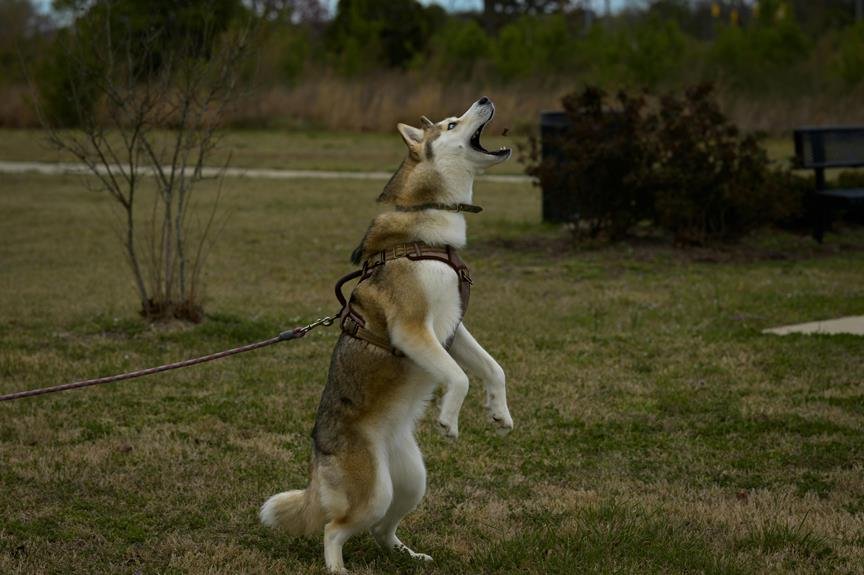
If you're struggling with your dog's excessive barking, there are practical strategies to explore. From understanding the root cause to implementing training techniques, a holistic approach is key. But what if there was a simple yet often overlooked solution that could make a significant difference in curbing your dog's barking habit?
Understanding the Root Cause
To address excessive barking in dogs, start by identifying the underlying cause. Excessive barking can stem from various triggers such as boredom, attention-seeking behavior, fear, territorial instincts, or separation anxiety. Observing your dog's behavior patterns can help pinpoint the root cause. If your dog barks more when left alone, it could indicate separation anxiety. On the other hand, if the barking intensifies when strangers approach, fear or territorial instincts might be the issue. Understanding why your dog is barking excessively is crucial in finding the most effective solution.
Additionally, consider environmental factors that could contribute to your dog's barking. Loud noises, lack of mental stimulation, or feeling threatened by other animals in the neighborhood can all lead to increased barking. By identifying and addressing these triggers, you can help your dog feel more secure and reduce their barking. Remember, every dog is unique, so take the time to observe and understand your furry friend's behavior to effectively tackle excessive barking.
Positive Reinforcement Training Techniques
Understanding the root cause of your dog's excessive barking can pave the way for implementing positive reinforcement training techniques effectively. Positive reinforcement focuses on rewarding your dog for behaving the way you want, rather than punishing them for unwanted behavior. When your dog barks excessively, try using treats, praise, or toys to reinforce quiet behavior.
One effective technique is to use a command like 'quiet' or 'enough' when your dog starts barking and reward them when they stop. This helps your dog associate being quiet with positive outcomes. Consistency is key – make sure to reward your dog every time they stop barking on command.
Another method is to teach your dog an alternative behavior, like fetching a toy or going to their bed when they feel the urge to bark. By redirecting their focus, you can help them learn to control their barking. Remember, patience and consistency are crucial when using positive reinforcement training techniques to address excessive barking.
Providing Mental and Physical Stimulation
Enhancing your dog's mental and physical stimulation is essential for preventing excessive barking and promoting overall well-being. To keep your furry friend engaged and content, provide ample opportunities for exercise. Regular walks, interactive play sessions, and engaging toys can help burn off excess energy, reducing the likelihood of incessant barking.
Introducing mental challenges is equally important. Puzzle toys, obedience training, and scent games are great ways to keep your dog mentally stimulated. These activities not only provide mental exercise but also strengthen the bond between you and your pet. A stimulated mind is less likely to resort to barking out of boredom or frustration.
Incorporating variety in your dog's daily routine is key. Rotate toys, change walking routes, and explore new environments to keep things interesting. Additionally, consider enrolling your dog in agility classes or trying out new activities like swimming or hiking. By keeping your dog physically and mentally engaged, you can help prevent excessive barking and ensure a happier, healthier pup.
Seeking Professional Help
If your dog's excessive barking persists despite your efforts to provide mental and physical stimulation, seeking professional help may be necessary. A certified dog trainer or animal behaviorist can assess your dog's barking behavior, identify the underlying causes, and develop a customized training plan to address the issue effectively.
These professionals have the expertise to determine whether your dog's barking is due to boredom, fear, anxiety, territorial behavior, or other triggers. They can provide you with guidance on how to modify your dog's behavior through positive reinforcement techniques, structured training exercises, and environmental management strategies.
Professional help can be particularly beneficial if your dog's barking is disrupting your daily life, causing tension with neighbors, or if you feel overwhelmed and unsure about how to address the problem on your own. By working with a qualified professional, you can gain valuable insights into your dog's behavior, learn effective training methods, and receive ongoing support to help you and your furry companion overcome the challenges associated with excessive barking.




